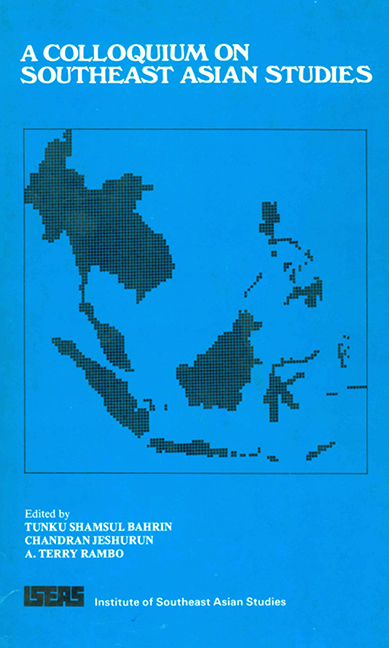Book contents
- Frontmatter
- Contents
- Foreword
- Preface
- Acknowledgements
- Introduction
- Contributors
- PART I TEACHING AND RESEARCH
- PART II ENVIRONMENT AND DEVELOPMENT
- 15 Environment and Development: The Place of Human Ecology in Southeast Asian Studies Programmes
- 16 Environment and Development in Southeast Asia: Trends, Themes and Issues
- 17 Development, Environmental Quality and the Quality of Life in Peninsular Malaysia
- 18 Environment Implications of the Mekong Development Programme
- 19 Development and Environment in Thailand
- 20 Review of Environmental Affairs in Indonesia
- 21 Research and Teaching on Human Ecology in Malaysia
- 22 Human Ecology in the Philippines: Developments in Research, Teaching and Applications
- 23 Environment Education Needs within A Southeast Asian Studies Programme
22 - Human Ecology in the Philippines: Developments in Research, Teaching and Applications
from PART II - ENVIRONMENT AND DEVELOPMENT
Published online by Cambridge University Press: 21 October 2015
- Frontmatter
- Contents
- Foreword
- Preface
- Acknowledgements
- Introduction
- Contributors
- PART I TEACHING AND RESEARCH
- PART II ENVIRONMENT AND DEVELOPMENT
- 15 Environment and Development: The Place of Human Ecology in Southeast Asian Studies Programmes
- 16 Environment and Development in Southeast Asia: Trends, Themes and Issues
- 17 Development, Environmental Quality and the Quality of Life in Peninsular Malaysia
- 18 Environment Implications of the Mekong Development Programme
- 19 Development and Environment in Thailand
- 20 Review of Environmental Affairs in Indonesia
- 21 Research and Teaching on Human Ecology in Malaysia
- 22 Human Ecology in the Philippines: Developments in Research, Teaching and Applications
- 23 Environment Education Needs within A Southeast Asian Studies Programme
Summary
This paper traces the background developments in human ecology in the Philippines and shows that its diverse and still separate origins and trends have begun to merge into a unified interdisciplinary approach. “Human ecology” is defined. Its particular developments in the Philippines are described by tracing early work in several disciplines. The paper then discusses work since 1972 in Philippine human ecological research, teaching and action programmes.
Considerable confusion exists regarding what human ecology is and what role it may play in research, teaching and applications. This uncertainty is a barrier to the development of the field in the Philippines. But the Philippines is by no means unique in this regard. It is timely that the diverse contributors to this presently quasi field seek agreement on an inclusive, interdisciplinary and dynamic definition and on the roles and goals of human ecology. For instance, is there really need for a special “human” ecology, why not just ecology? before we answer, it is worth reconsidering the term “ecology”.
A succinct definition of ecology is difficult. Growing public concern about environmental degradation has given rise to distorted usages that tend, by treating manking and environment as independent of each other, to lead away from a productive ecological perspective. Steps toward a workable definition must begin therefore with what ecology is not. It is not equivalent to environment, although it is presently used in this sense by some environmentalists and most of the lay public. Neither is it synonymous with conservation and narrowly construed nor does it, in any strict sense, refer to the unforeseen consequences of many of man's activities, as in the phrase “ecological boomerang”. In fact, the standard dictionary definition of ecology — “the study of relations between organisms and their environment” — is itself misleading if it is not understood as requiring a holistic, reciprocal mode of thought.
- Type
- Chapter
- Information
- A Colloquium on Southeast Asian Studies , pp. 275 - 288Publisher: ISEAS–Yusof Ishak InstitutePrint publication year: 1981



